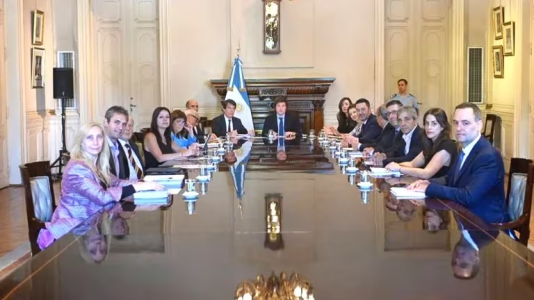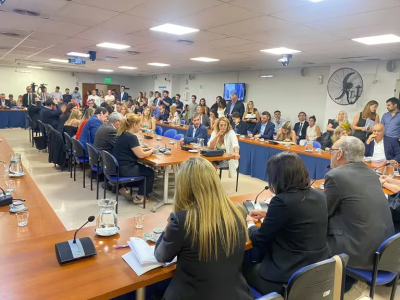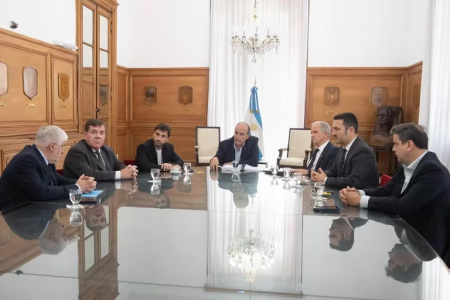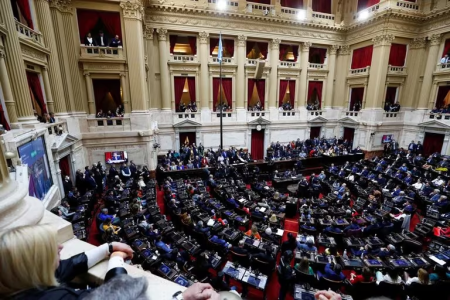Omnibus Law: the Government gave a first signal to make changes and opens the door for the opposition to negotiate - Infobae

Source:
January 05, 2024
They warn that modifications to the project will have to be agreed upon to achieve its approval. The main criterion is rationality and common sense,” they stated in the ruling party.
By Joaquín Múgica Diaz

The Government gave a first sign of opening so that the negotiation begins to flow in Congress and with the governors
The national government gave a first sign of opening to negotiation in order to approve the omnibus law . Yesterday the Minister of the Interior, Guillermo Francos, decided to go back and accept modifications in the articles referring to fishing activity. It was a request from the Patagonian governors that was carried out by the president of Chubut, Ignacio Torres.
“We are going to clarify some points of the law because the spirit is the same as that of the provincial governments. "What we intend is for this entire process to be done in an efficient manner to protect Argentine fishing," said the national official after agreeing that he would make modifications to the articles linked to unloading in Argentine ports, the maintenance of the exclusive zone and the fishing quotas with foreign companies.
It was a gesture that was needed in the parliamentary sphere and among the opposition governors, since, except for Peronism and the left, the opposition has the will to accompany the project< /span> of reform and give governance to Milei. What they are asking is to negotiate some important points that they are not willing to vote on. The most relevant case is the delegation of powers from the Legislative Branch to the Executive, an article that for radicalism and the Civic Coalition is impossible to pass.
“No one renounces their own power”, was the definition, ironic and from the underground of politics, that a legislator from the UCR used to point out that, beyond considering it an authoritarian measure, that article is unviable. “They have to forget about that point. There is no way for us to vote for it”, stated an important radicalist deputy.

Yesterday four commissions were formed where next week the omnibus law will begin to be discussed
In the opposition most inclined to support the project, they decoded the modification of the articles on fishing as a positive sign moving forward. “It's good that they realized that they have to negotiate”, reflected a legislator who is part of the bloc led by Miguel Pichetto, although the doubts about whether the ruling party is going to be flexible to negotiate more points of the extensive law. It's a first step. Important, but only one step.
Another legislator, from the UCR, was sarcastic after the official decision to back down: “Didn't Milei say that those who wanted changes were coimeros?” In the legislative sphere those statements of the Head of State fell very badly.. They do not forget it although they do not bind themselves to those words to block the treatment of the law. Radicalism, the Civic Coalition, socialism and anti-K Peronism are the opposition with the will to support. The PRO will do it without too many questions. Union for the Homeland and the left reject the project.
If the Government is willing to negotiate and modify different articles, then it is most likely that the debate will extend and that the law will not be issued before the end of January, as the President wants. Opening the door to modifications in order to pass the law is the logical path but, at the same time, it would make the debate in the committees longer, added to the changes that may arise when each article is voted on individually.
In short, giving unusual speed to the approval of the law is a strategy that will end badly because it does not have the support of the majority of the deputies. On the other hand, a slower path but negotiating some key points such as withholdings, the pension system or the privatization of companies, could give him the number to move the project forward. “With what happened with the Patagonian governors, Milei showed that it does not have the agreements for such a law”, warned an opposition representative with a long political career .
The concession of the Government to the leaders of the south can be read as a breaking point in this stage of disorderly discussions surrounding the omnibus law. A national government official made it clear what that political signal implies in a single definition: “You have to listen to the governors and understand them. The main criterion is rationality and common sense”.

Guillermo Francos, together with the governor of Chubut, Ignacio Torres.
At this time there seems to be a key change in the Government that has to do with revaluing the role of politics. Until now the intention was to push the law with the argument that Argentines voted for a profound change and that opposition legislators should be condescending to that demand. However, the parliamentary work to get the laws passed requires a different dynamic and time than what Casa Rosada wants to apply to the treatment of the law.
There are even sectors of the opposition that began to suspect that the decision to move forward with the project with a closed book - that is, without room to negotiate changes, as Milei had asked his deputies - could be due to a strategy that sought to victimize themselves, hold the opposition responsible for not endorsing the change with their votes in Congress and governing by dint of Decrees of Necessity and Urgency (DNU).
That projection that they have had for days in different opposition terminals was limited by the modification in fishing articles. Changes that may not end up being so big but that have an important symbolic weight at a time when opponents are demanding that the Government open the game and agree to agree on modifications to achieve a majority that accompanies the project in Congress.
“We have to start generating flexibility. Not everything is black or white. And let the logic of congressional paralysis not defeat us either. We have to be permeable and negotiate so that changes occur. Things have to happen. Without politics, the law does not come out”, a high-ranking government source said in the last few hours. A portrait of a change in the way the ruling party acts.

If the negotiation extends, the law will probably not end up being approved before the end of January, as the President wants (REUTERS/Agustin Marcarian)
Those who saw the President in recent days assure that he is clear that it is necessary to negotiate modifications, regardless of his speech being the if it is not done. His unprecedented and uncompromising message of change clashed with parliamentary reality. The need to open new channels to keep the bill afloat and bring it to the floor began to gain the upper hand over the campaign speech, which has little to do with the obligation to manage and reach agreements to govern.
In Peronism they are tougher. Standing in a place of rawer opposition. An influential legislator assured that the Government's reversal on the issue of fishing “is a sign that they sent a law with many articles without consulting anything with the sectors they had to consult” a>, which is why they are obliged to generate changes. In any case, for Unión por la Patria (UP) the key point of the conflict with the ruling party is the content of the DNU, which has not yet been sent to Congress .

Source:
January 05, 2024
They warn that modifications to the project will have to be agreed upon to achieve its approval. The main criterion is rationality and common sense,” they stated in the ruling party.
By Joaquín Múgica Diaz

The Government gave a first sign of opening so that the negotiation begins to flow in Congress and with the governors
The national government gave a first sign of opening to negotiation in order to approve the omnibus law . Yesterday the Minister of the Interior, Guillermo Francos, decided to go back and accept modifications in the articles referring to fishing activity. It was a request from the Patagonian governors that was carried out by the president of Chubut, Ignacio Torres.
“We are going to clarify some points of the law because the spirit is the same as that of the provincial governments. "What we intend is for this entire process to be done in an efficient manner to protect Argentine fishing," said the national official after agreeing that he would make modifications to the articles linked to unloading in Argentine ports, the maintenance of the exclusive zone and the fishing quotas with foreign companies.
It was a gesture that was needed in the parliamentary sphere and among the opposition governors, since, except for Peronism and the left, the opposition has the will to accompany the project< /span> of reform and give governance to Milei. What they are asking is to negotiate some important points that they are not willing to vote on. The most relevant case is the delegation of powers from the Legislative Branch to the Executive, an article that for radicalism and the Civic Coalition is impossible to pass.
“No one renounces their own power”, was the definition, ironic and from the underground of politics, that a legislator from the UCR used to point out that, beyond considering it an authoritarian measure, that article is unviable. “They have to forget about that point. There is no way for us to vote for it”, stated an important radicalist deputy.

Yesterday four commissions were formed where next week the omnibus law will begin to be discussed
In the opposition most inclined to support the project, they decoded the modification of the articles on fishing as a positive sign moving forward. “It's good that they realized that they have to negotiate”, reflected a legislator who is part of the bloc led by Miguel Pichetto, although the doubts about whether the ruling party is going to be flexible to negotiate more points of the extensive law. It's a first step. Important, but only one step.
Another legislator, from the UCR, was sarcastic after the official decision to back down: “Didn't Milei say that those who wanted changes were coimeros?” In the legislative sphere those statements of the Head of State fell very badly.. They do not forget it although they do not bind themselves to those words to block the treatment of the law. Radicalism, the Civic Coalition, socialism and anti-K Peronism are the opposition with the will to support. The PRO will do it without too many questions. Union for the Homeland and the left reject the project.
If the Government is willing to negotiate and modify different articles, then it is most likely that the debate will extend and that the law will not be issued before the end of January, as the President wants. Opening the door to modifications in order to pass the law is the logical path but, at the same time, it would make the debate in the committees longer, added to the changes that may arise when each article is voted on individually.
In short, giving unusual speed to the approval of the law is a strategy that will end badly because it does not have the support of the majority of the deputies. On the other hand, a slower path but negotiating some key points such as withholdings, the pension system or the privatization of companies, could give him the number to move the project forward. “With what happened with the Patagonian governors, Milei showed that it does not have the agreements for such a law”, warned an opposition representative with a long political career .
The concession of the Government to the leaders of the south can be read as a breaking point in this stage of disorderly discussions surrounding the omnibus law. A national government official made it clear what that political signal implies in a single definition: “You have to listen to the governors and understand them. The main criterion is rationality and common sense”.

Guillermo Francos, together with the governor of Chubut, Ignacio Torres.
At this time there seems to be a key change in the Government that has to do with revaluing the role of politics. Until now the intention was to push the law with the argument that Argentines voted for a profound change and that opposition legislators should be condescending to that demand. However, the parliamentary work to get the laws passed requires a different dynamic and time than what Casa Rosada wants to apply to the treatment of the law.
There are even sectors of the opposition that began to suspect that the decision to move forward with the project with a closed book - that is, without room to negotiate changes, as Milei had asked his deputies - could be due to a strategy that sought to victimize themselves, hold the opposition responsible for not endorsing the change with their votes in Congress and governing by dint of Decrees of Necessity and Urgency (DNU).
That projection that they have had for days in different opposition terminals was limited by the modification in fishing articles. Changes that may not end up being so big but that have an important symbolic weight at a time when opponents are demanding that the Government open the game and agree to agree on modifications to achieve a majority that accompanies the project in Congress.
“We have to start generating flexibility. Not everything is black or white. And let the logic of congressional paralysis not defeat us either. We have to be permeable and negotiate so that changes occur. Things have to happen. Without politics, the law does not come out”, a high-ranking government source said in the last few hours. A portrait of a change in the way the ruling party acts.

If the negotiation extends, the law will probably not end up being approved before the end of January, as the President wants (REUTERS/Agustin Marcarian)
Those who saw the President in recent days assure that he is clear that it is necessary to negotiate modifications, regardless of his speech being the if it is not done. His unprecedented and uncompromising message of change clashed with parliamentary reality. The need to open new channels to keep the bill afloat and bring it to the floor began to gain the upper hand over the campaign speech, which has little to do with the obligation to manage and reach agreements to govern.
In Peronism they are tougher. Standing in a place of rawer opposition. An influential legislator assured that the Government's reversal on the issue of fishing “is a sign that they sent a law with many articles without consulting anything with the sectors they had to consult” a>, which is why they are obliged to generate changes. In any case, for Unión por la Patria (UP) the key point of the conflict with the ruling party is the content of the DNU, which has not yet been sent to Congress .

